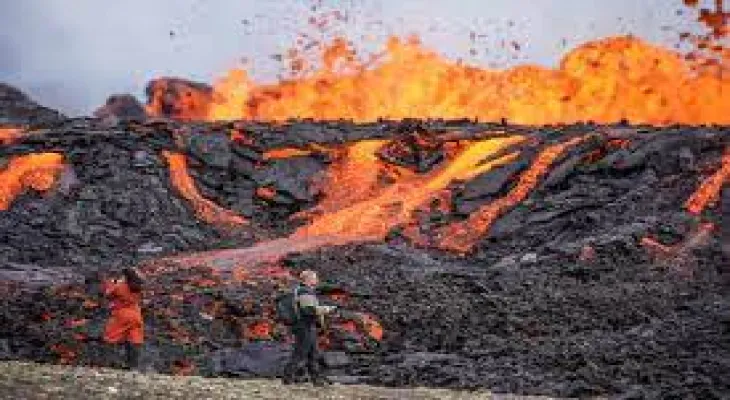Search here
Newspaper
Search here

Arab Canada News
News

Published: July 11, 2023
Authorities in Iceland warned today, Tuesday, tourists and other spectators to stay away from a newly erupted volcano that is spewing lava and harmful gases from a fissure in the southwest of the country.
The meteorological authorities said that the volcanic eruption began on Monday afternoon after thousands of earthquakes in the area, coming 11 months after its last eruption officially ended. The explosion occurred in an uninhabited valley near Mount Litli-Hrutur, about 30 kilometers southwest of the capital Reykjavik.
The area, widely known as the Fagradalsfjall volcano, erupted in 2021 and 2022 without causing damage or disruptions to flights. Despite its proximity to Keflavik Airport, the international air traffic center in Iceland, the airport remained open today.
The Icelandic Meteorological Office said the eruption was initially more explosive than the previous two, and aerial footage showed streams of molten orange lava and plumes of gases emitting from a 900-meter-long snake-like fissure.
The Meteorological Office confirmed “that gas pollution is high around the eruption and dangerous, and travelers are advised not to enter the area until responders have a chance to assess the conditions,” while scientists said that by Tuesday morning, the fissure and the size of the volcanic eruption had shrunk.
A geophysics professor at the University of Iceland said, “This has become a small eruption, which is very good news. The eruption can definitely continue for a long time, but fortunately we are not looking at the continuation of what we saw in the first few hours.”
A 2021 volcanic eruption in the same area led to stunning lava flows for several months, and hundreds of thousands of people flocked to see the scene. Iceland, located above a volcanic hotspot in the north Atlantic Ocean, has an average eruption every four to five years.
The most recent major eruption was the Eyjafjallajökull volcano eruption in 2010, which sent huge ash clouds into the atmosphere and led to widespread airspace closures over Europe. More than 100,000 flights were canceled, stranding millions of international travelers and halting air travel for several days due to concerns that the ash could damage aircraft engines.
Comments